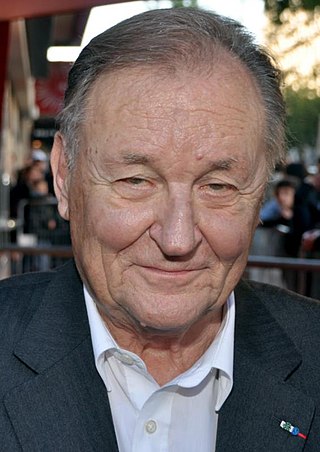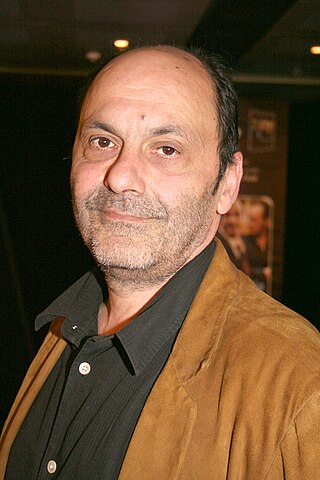
Asterix is a French comic album series about a Gaulish village which, thanks to a magic potion that enhances strength, resists the forces of Julius Caesar in an ahistorical telling of the time after the Gallic Wars. Many adventures take the titular hero Asterix and his friend Obelix to Rome and beyond.

Alberto Aleandro Uderzo, better known as Albert Uderzo, was a French comic book artist and scriptwriter. He is best known as the co-creator and illustrator of the Astérix series in collaboration with René Goscinny. He also drew other comics such as Oumpah-pah, again with Goscinny. Uderzo retired in September 2011.

The Song of Roland is an 11th-century chanson de geste based on the deeds of the Frankish military leader Roland at the Battle of Roncevaux Pass in AD 778, during the reign of the Emperor Charlemagne. It is the oldest surviving major work of French literature. It exists in various manuscript versions, which testify to its enormous and enduring popularity in Medieval and Renaissance literature from the 12th to 16th centuries.
Switzerland was represented at the Eurovision Song Contest 1956 with two songs: "Das alte Karussell" written by Georg Betz-Stahl, and "Refrain" composed by Géo Voumard, with lyrics by Émile Gardaz. Both songs were performed by Lys Assia. The Swiss participating broadcaster, the Swiss Broadcasting Corporation, selected its entries through a national final. In addition, Radio svizzera italiana (RSI), on behalf of SRG SSR, was the host broadcaster and staged the event at the Teatro Kursaal in Lugano. "Das alte Karussell" was the first-ever entry from Switzerland performed in the Eurovision Song Contest, and the first-ever entry in German in the contest; while "Refrain", that eventually won the contest, was the first-ever winner in its history.

The chanson de geste is a medieval narrative, a type of epic poem that appears at the dawn of French literature. The earliest known poems of this genre date from the late 11th and early 12th centuries, shortly before the emergence of the lyric poetry of the troubadours and trouvères, and the earliest verse romances. They reached their highest point of acceptance in the period 1150–1250.

Georges Charles Brassens was a French singer-songwriter and poet.
A chanson is generally any lyric-driven French song. The term is most commonly used in English to refer either to the secular polyphonic French songs of late medieval and Renaissance music or to a specific style of French pop music which emerged in the 1950s and 1960s. The genre had origins in the monophonic songs of troubadours and trouvères, though the only polyphonic precedents were 16 works by Adam de la Halle and one by Jehan de Lescurel. Not until the ars nova composer Guillaume de Machaut did any composer write a significant number of polyphonic chansons.
Roger Carel was a French actor, known for his recurring film roles as Asterix, the French voice of Star Wars' C-3PO, and the French voice of Winnie-the-Pooh, Piglet, and Rabbit in Winnie the Pooh. He dubbed David Suchet as Hercule Poirot on Agatha Christie's Poirot. He also voiced Wally Gator, Mickey Mouse, Yogi Bear, Fred Flintstone, Kermit the Frog, Heathcliff, Danger Mouse, Foghorn Leghorn, ALF, Fat Albert and many other famous characters in French.

Gérard Lenorman is a French singer-songwriter.
"Why" is a hit song recorded by Frankie Avalon in 1959. It reached No. 1 on the U.S. Billboard Hot 100 chart published on the week of December 28, 1959. It was Avalon's second and final No. 1 hit.

Pierre Tcherniakowski, better known as Pierre Tchernia, was a French cinema and television producer, screenwriter, presenter, animator and actor. In France, he was known as "Magic" Tchernia and Monsieur Cinema.

Jean-Pierre Bacri was a French actor and screenwriter.
"Chanson D'Amour" is a popular song written by Wayne Shanklin. A 1977 recording by the Manhattan Transfer was an international hit, reaching number one on the UK Singles Chart.
All the Asterix stories, created by René Goscinny and Albert Uderzo, have been translated into English. The vast majority of the albums were translated by Anthea Bell and Derek Hockridge. Their first volume, Asterix the Gaul, was published by Brockhampton Press in 1969. Bell retired in 2016 due to ill health and died in 2018; Hockridge died in 2013. Adriana Hunter currently serves as translator, with Asterix and the Chariot Race being her debut.

"Au clair de la lune" is a French folk song of the 18th century. Its composer and lyricist are unknown. Its simple melody is commonly taught to beginners learning an instrument.
Ernest Shand was an English performer and composer for the classical guitar, and a music-hall singer and actor.
Frederick Johnson "F.J". Barnes was an English songwriter, who co-wrote numerous songs with R. P. Weston and Fred Godfrey.

Galiens li Restorés, or Galien le Restoré or Galien rhétoré, is an Old French chanson de geste which borrows heavily from chivalric romance. Its composition dates anywhere from the end of the twelfth century to the middle of the fourteenth century. Five versions of the tale are extant, dating from the fifteenth century to the sixteenth century, one in verse and the others in prose. The story—which is closely linked to the earlier chansons de gestePèlerinage de Charlemagne and The Song of Roland —tells of the adventures of Galien, son of the hero Olivier and of Jacqueline, the daughter of the (fictional) emperor Hugon of Constantinople.
Luxembourg was represented at the Eurovision Song Contest 1976 with the song "Chansons pour ceux qui s'aiment", composed by Jack White, with lyrics by Fred Jay and Vline Buggy, and performed by Jürgen Marcus. The Luxembourgish participating broadcaster, the Compagnie Luxembourgeoise de Télédiffusion (CLT), selected its entry through a national final. Marcus was the first German singer to represent Luxembourg, as their 1974 representative Ireen Sheer, although German-based, was British by birth.

Les Compagnons de la chanson were a French harmony vocal group, formed in 1946 from an earlier group founded in Lyon, France in 1941. Their best known song was "Les trois cloches" recorded with Edith Piaf in 1946. Consisting of eight or nine members in the group, they were popular in France, with some success internationally. They performed until 1985 when they disbanded.










